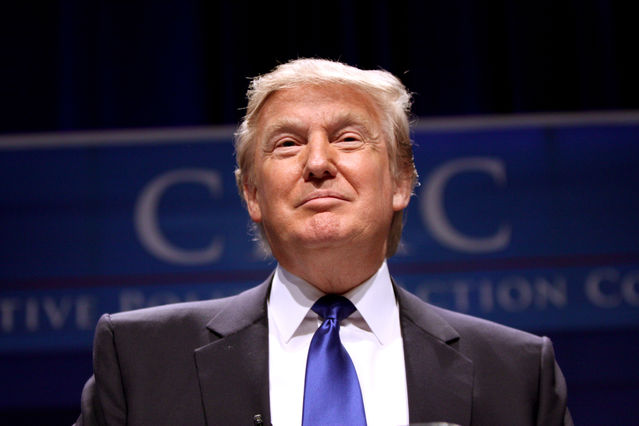President Donald Trump
Would a Trump Presidency Make Us Happy?
Research suggests Trump policies a mixed bag for human well-being
Posted May 5, 2016

Co-authored with my colleague Professor Michael Krassa of the University of Illinois-Urbana.
Donald Trump is now virtually certain to be the Republican nominee for president in the upcoming presidential election. What does the peer reviewed literature in happiness economics say about the results of a Trump win in November?
The most striking of Mr. Trump's policy proposals involve immigration--and, according to his critics, the ethnic, cultural, and religious intolerance behind them. The most obvious examples are, of course, his plan to build a wall literally dividing the United States from Mexico, and his call to at least temporarily halt all non-citizen Muslims from entering the US. These proposals have been widely attacked as promoting intolerance and fear of "the other."
While Trump dismisses such claims, some of his comments have certainly been inflammatory. The most infamous are his remarks about Mexicans (extended subsequently to immigrants from "all over South and Latin America") being "criminals" and "rapists." Many of his later pronouncements have only cemented doubts about bigotry, exemplified perhaps most alarmingly by his favorably quoting Mussolini (and then doubling-down on that praise after being criticized for it).
Let us suppose, for the sake of argument, that Mr. Trump follows through with his policy proposals and otherwise continues with rhetoric similar to that used in his campaign. It seems likely that the result of a Trump presidency could only be a decrease in the nation's general level of tolerance. The implications of that, in turn, are clear enough: it would produce an equivalent decline in overall levels of happiness.
This contention is confirmed by much work in happiness economics, and in particular by the work of political scientists Ronald Inglehart and Christian Welzel. They find that since the early 1980s there has been a general increase in happiness across the world, fueled to a significant degree by increases in social tolerance. This conclusion is documented in a series of papers in major peer reviewed journals (see for instance this paper from Social Indicators Research) and two books published by the premiere Cambridge University Press (Inglehart and Welzel, 2005. Modernization, Cultural Change and Democracy, and Welzel, 2013. Freedom Rising: Human Empowerment and the Quest for Emancipation). They stress not only the importance of higher levels of tolerance in general, but in particular the increase in what they call "emancipative values," which involves not only less prejudice as conventionally understood--against ethnic/racial and religious minorities--but also the acceptance of different "alternative" lifestyles, greater gender equality, acceptance of same sex relationships, and so on. In general, the more tolerant, open, and progressive public attitudes become, the happier people in general become.
To the extent Mr. Trump stands in opposition to those values, his presidency would clearly reduce well-being. We hasten to note that as researchers have no professional opinion on Trump's own values--we leave the reader to make their own judgment.
Turning to economic policy, much academic research documents an intimate connection between public policy and happiness. We have discussed this work in some detail in prior posts explaining why Denmark is the happiest country in the world, why the most liberal American States have the lowest suicide rates of suicide (and the highest levels of happiness), and, in general, why progressive rather than conservative public policies promote higher levels of happiness. Each of these posts is based on peer reviewed, nonpartisan, academic studies (a number of which you can read in full text here).
While the collective evidence will not please conservatives (who may take comfort in the fact that is more to evaluating policy than the effects on happiness), it is very clear in its conclusions: happiness is driven by the generosity of the social safety net and, more generally, by the size and scope of government. A higher tax burden to pay for such, and the resulting increase in the total level of government "consumption" of the economy, also both produce more happiness, as this implies a more democratic and therefore (presumably) more just allocation of economic resources.
The research discussed above also finds that pro-worker labor market regulations, such as the minimum wage, increase satisfaction. Labor unions also contribute to happiness, not only for their members but for society at large, because of their political support for policies (like the minimum wage) that foster the happiness of all.
Considering the results of a Trump presidency in light of this evidence is more difficult than we considering his potential impact on tolerance, given that his policies are here both less well articulated and less in line with Republican orthodoxy. That orthodoxy is most precisely and consistently represented by Mr. Cruz. It may thus be useful to consider Cruz policies as a foil for Mr. Trump.
Mr. Cruz a proposed tax plan that would drastically reduce federal income tax revenues (by around $9 trillion over ten years) to be accompanied by corresponding reductions in government spending. Mr. Cruz wants to begin by eliminating the IRS, the Department of Education, the Department of Energy, the Department of Commerce, and the Department of Housing and Urban Development, along with 25 other agencies or programs. He would also work to reduce government regulations designed to protect workers and consumers, eliminate various subsidies for working people (such as Section 8 housing), and “repeal every word of Obamacare.”
The research summarized above clearly suggests that such an effort to explicitly “shrink the size and power of the federal government” would produce a substantial drop in life satisfaction across all income groups. The enormous decline in union membership that would result from passing the National Right to Work Act that Mr. Cruz has co-sponsored would have similar consequences. Mr. Cruz’s plan for phasing out Social Security, which would leave the country without a system of guaranteed old age pensions, would further erode life satisfaction.
Mr. Trump's plans overlap to some degree with Cruz's. Trump proposed a tax plan that would cut revenue by almost exactly the same amount as Mr. Cruz (with most of the benefits of going to those with the highest incomes, as did the Cruz plan). Trump also claims to wish to cut government spending (as his tax plan would indeed require), but he has also been at pains to distance himself from other Cruz and other Republicans by striking a more moderate tone on Social Security, which he says he wishes to preserve (without raising the retirement age). In general Trump, has tried both to be an enemy of "big government" and a protector of the disadvantaged working class voters who make up much of his constituency. Thus while promising that Obamacare would be repealed, he has also suggested (to consternation of many conservative commentators) that he would not allow “people to die on the streets” for lack of health insurance. While it is difficult to discern Mr. Trump’s overall spending plans, it seems likely that he does not envision the unprecedented cuts to government that Mr. Cruz favors. Instead, Mr. Trump appears to be following the Ronald Reagan playbook of proposing huge tax cuts without suggesting substantial reductions in popular programs.
In terms of labor rights, Mr. Trump has (characteristically) taken contrary positions, sometimes praising organized labor, while also vigorously opposing attempts to organize in his hotels. He has also expressed support for right to work laws, though he has not taken a position on a national right-to-work law; it is difficult to believe, though, that he would veto such a bill sent him by a Republican Congress. On the other hand, Mr. Trump has also recently expressed some support for a substantial (but not specified) increase in the minimum wage, which is anathema to conservatives, and which would (unlike a right-to-work law) improve well-being.
In sum, only Mr. Trump understands what he would do as president on taxing and spending or labor issues. If we take it for granted that he would push for the massive tax decrease already proposed (itself likely to reduce well-being, according to the research), which would have to be paid for by reduced spending on social services, the result would certainly be downward pressure on happiness. If he were to lend his support to strong anti-union legislation, as seems more likely than not, this would also be a major blow to well-being in the United States.
On the other hand, if Mr. Trump is sincere in wishing to continue to provide the equivalent of Obamacare by another name, to raise the minimum wage, and to resist attempts to privatize Medicare and Social Security, he would through these policies (at least) promote well-being.
Read a chapter from Radcliff's book The Political Economy of Human Happiness (Cambridge University Press, 2013) here. Read a number of our popular press articles on happiness and politics here.
Professor Michael Krassa: @ProfKrassa
Professor Benajmin Radcliff: @Radcliff_Ben




